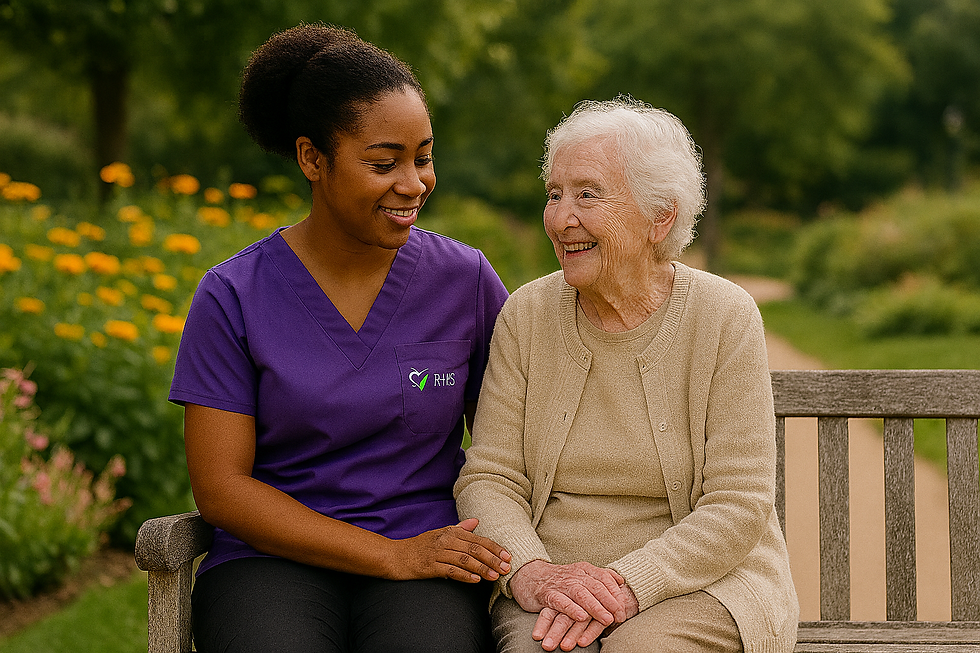Caring for Someone with Dementia: Practical Tips for Better Care
- cynthia arovo

- Jun 2, 2025
- 3 min read
Updated: Jul 19, 2025
Understanding the Emotional and Practical Aspects of Caring for Someone with Dementia
As you embark on this journey, it's important to recognize both the emotional and practical challenges. Caregivers can experience a range of emotions, including sadness, frustration, and even guilt. Acknowledging these feelings is the first step toward emotional wellness. Seek support from friends, family, or support groups to share experiences and strategies. You are not alone in this journey.
🧩 1. Understand Dementia: The First Step in Caring for Someone with Dementia
Learning about dementia is essential. Familiarize yourself with the type and progression of the condition. This knowledge enables you to respond with patience, empathy, and informed care. Understanding cognitive decline helps you anticipate challenges and identify effective strategies for everyday situations. This awareness is vital, especially when you are caring for someone with dementia at home.
🏡 2. Create a Calm, Safe Environment
Creating a safe environment is crucial when caring for someone with dementia. As confusion or mobility issues arise, adapting your home is necessary. Remove hazards like tripping risks or sharp objects. Clear clutter, and consider using labels to identify rooms and objects. These small adjustments foster a feeling of security, helping your loved one feel comfortable in familiar surroundings.
📅 3. Stick to a Routine
People living with dementia thrive on structure and consistency. Establish a daily routine to help support memory and reduce anxiety. Morning activities can include a set breakfast time, followed by tasks like walking or discussing cherished memories. Consistent schedules build trust and provide a sense of control, making them important in daily care.
💬 4. Communicating Effectively When Caring for Someone with Dementia
Effective communication plays a key role in caring for someone with dementia. Using a gentle tone, maintaining eye contact, and speaking in short sentences can enhance understanding. Nonverbal cues, like gestures and facial expressions, also contribute to effective communication. Be patient and give ample time for responses, fostering a sense of dignity.
👥 5. Encourage Independence Where Possible
Encouraging independence, even in small tasks, is crucial. It supports your loved one's dignity and confidence. Allow them to participate in activities like dressing or preparing simple meals, offering guidance as needed. This often-overlooked aspect of care allows your loved one to feel valued and engaged, which is vital for their well-being.
🧘 6. Take Breaks and Ask for Help
Remember that you cannot pour from an empty cup. Taking regular breaks is essential for your mental and physical health. It’s okay to ask for help from family, friends, or professional caregivers. Sharing responsibilities can alleviate stress and prevent burnout, allowing you to provide the best care possible.
🧑⚕️ 7. Know When to Get Professional Support
At times, family caregiving alone may not suffice. When the symptoms progress, consider seeking professional support. Dementia home care services can offer specialized assistance, allowing your loved one to remain in a familiar environment. This option can be vital, offering you peace of mind, especially during challenging times.
Maintaining Your Wellbeing as a Caregiver
Being a caregiver can be overwhelming, but it's important to prioritize your health. Engage in activities you enjoy and make time to relax. Whether it's reading, gardening, or exercising, self-care contributes to your overall well-being. Remember, taking care of yourself allows you to care for others more effectively.
Seeking Resources and Support
There are numerous resources available for caregivers. Local support groups often provide connections with others in similar situations. They offer encouragement, advice, and the chance to share experiences. Look for workshops or online courses that focus on dementia care for additional insights and techniques.
Conclusion
Caring for someone with dementia is a journey filled with both challenges and rewards. Approaching this experience with compassion, structure, and the right support ensures that your loved one can maintain dignity while you protect your own well-being too. If you’re in Medway or the surrounding areas, The Right Healthcare Services is here to help. We provide expert, CQC-registered dementia care at home.
📞 Let’s Talk
If you’re noticing signs of dementia and wondering what to do next, we’re here to help. Book a free consultation with our team to explore your options with no pressure.
👉 Care@therightcaregroup.co.uk 📞 Call us at 01634912487




Comments